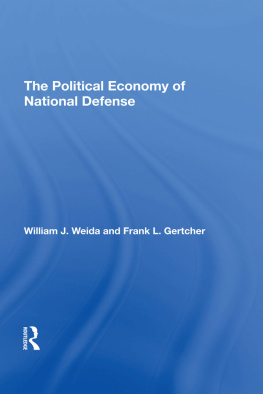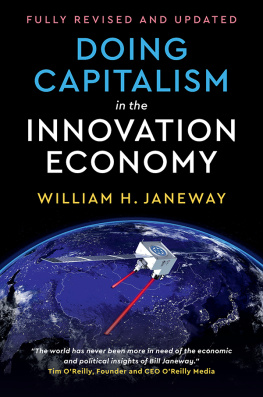The Political Economy of National Defense
About the Book and Authors
This timely and wide-ranging study covers both the economic and the political aspects of defense spendingfirst by providing a theoretical framework and then by explaining, in a political economy context, the results of decisions to allocate scarce resources to defense. In doing so, the authors provide a comprehensive picture of the interaction between defense spending and the economic and political structure of the United States, complementing their exploration of topical concerns such as SDI with analysis of long-term trends and issues of timeless importance in the defense debate.
Because of the politicizing of defense planning and procurement, there have been few significant applications of optimization techniques to high-level defense issues over the past decade. As a result, there has been a rapid decline in the importance of those techniqueshistorically the focus of books on defense economics. Like its predecessors, this book presents optimization techniques applicable to a wide variety of defense problems, but it also illustrates what happens in actual practice and why defense decisions are often not economically efficient. The authors discuss alternatives for cases when political constraints make efficient solutions unlikely and explore changes in the defense establishment and political structures that would make economically efficient resource allocations a reality.
William J. Weida is associate professor at The Colorado College, Colorado Springs, Colorado. Frank L. Gertcher is senior research specialist at R&D Associates, Colorado Springs, Colorado.
First published 1987 by Westview Press
Published 2019 by Routledge
52 Vanderbilt Avenue, New York, NY 10017
2 Park Square, Milton Park, Abingdon, Oxon OX14 4RN
Routledge is an imprint of the Taylor & Francis Group, an informa business
Copyright 1987 Taylor & Francis
All rights reserved. No part of this book may be reprinted or reproduced or utilised in any form or by any electronic, mechanical, or other means, now known or hereafter invented, including photocopying and recording, or in any information storage or retrieval system, without permission in writing from the publishers.
Notice:
Product or corporate names may be trademarks or registered trademarks, and are used only for identification and explanation without intent to infringe.
Library of Congress Cataloging-in-Publication Data
Weida, William J.
The political economy of national defense.
Bibliography: p.
Includes index.
1. United States Armed ForcesAppropriations and
expenditures.2. MunitionsUnited States.
3. MunitionsEconomic aspectsUnited States.
4. BudgetUnited States.5. United StatesMilitary
policy. 6. United StatesPolitics and government
1981- .I. Gertcher, Frank L.II. Title.
UA23.W3694 1987 355.6220973 86-19015
ISBN 13: 978-0-367-29493-9 (hbk)
Contents
Part 1
The Economics and Politics of National Defense
Part 2
The Defense Industry
Part 3
The Economics of New Strategies
We developed this book to cover both the economic and the political aspects of defense spendingfirst by providing a theoretical framework and then by explaining, in a political economy context, the results of decisions to allocate scarce resources to defense. In so doing, we attempted to provide a comprehensive picture of the interaction of defense spending with the economic and political structure of the United States.
Past defense economics books have generally confined themselves to explaining the applications of economic optimization techniques to defense problems. However, there have been few important applications of these techniques to high-level defense issues over the past ten years, mainly because of the politicizing of the defense planning and procurement processes. This politicized approach has been accompanied by increasing defense budgets and deep ideological differences on the relative value of key weapon systems. The result has been a decline in the importance of optimization techniques in the top-level management of todays defense establishment and in the planning of tomorrows defense systems.
Following its predecessors, The Political Economy of National Defense presents applicable optimization techniques for a wide variety of defense problems, but it also shows what happens in actual practice and why defense decisions often are not economically efficient. In some cases, the book also points out possible solutions. In cases where efficient solutions are not possible, given the relevant political constraints, the book discusses possible alterations to defense establishment structures that would permit more efficient solutions.
This book is designed for serious students of defense economics, for defense planners, and for people who wish to increase their understanding of the political economy of defense. Students may wish to spend extra time on the theoretical discussions and may wish to seek additional details in the references cited in the notes at the end of each chapter. The more casual reader may prefer to spend less time on the technical details in favor of a more general review of the analyses and the conclusions. In either case, this book should provide the reader with a bridge between the theoretical world of economic efficiency and the politically motivated world of high-level defense planning.
William J. Weida
Frank L. Gertcher
We are grateful to the many individuals who aided in the preparation of The Political Economy of National Defense. Dr. Donald C. Washburn and others at R&D Associates graciously provided useful information on defense programs. Major Terry Raney and others at the Air Force Academy provided insightful reviews and comments. Professors George Staller and Judith Reppy of Cornell University provided both guidance and helpful suggestions. We also want to thank Lisa Gertcher, who typed four chapters of the manuscript and put up with her fathers many revisions, and Joyce DeMeyer, who did an excellent job on the tables and figures. Finally, we want to thank our wives, Betty and Judy, for their encouragement and for listening patiently over the past two years to periodic lectures on the importance of defense economics.
Although every effort was made to eliminate errors in the book, we recognize that some may have slipped through. For these we take full responsibility, and we encourage readers to correspond with us concerning corrections and suggestions for improvements.
W.J.W.
F.L.G.
Part 1
The Economics and Politics of National Defense
1
The Dual Nature of Defense
The fundamental goals of U.S. national security policy have remained essentially unchanged since the end of World War II. These are to preserve the independence, institutions, territory, and interests of the United States and to shape an international order in which U.S. institutions and freedoms can survive and prosper.
U.S. political leaders have developed certain national security objectives to support national security policy. Some current objectives were established by previous administrations; others are new or have been modified in response to changes and emerging trends in the international situation. As the end of the twentieth century approaches, the objectives include:






